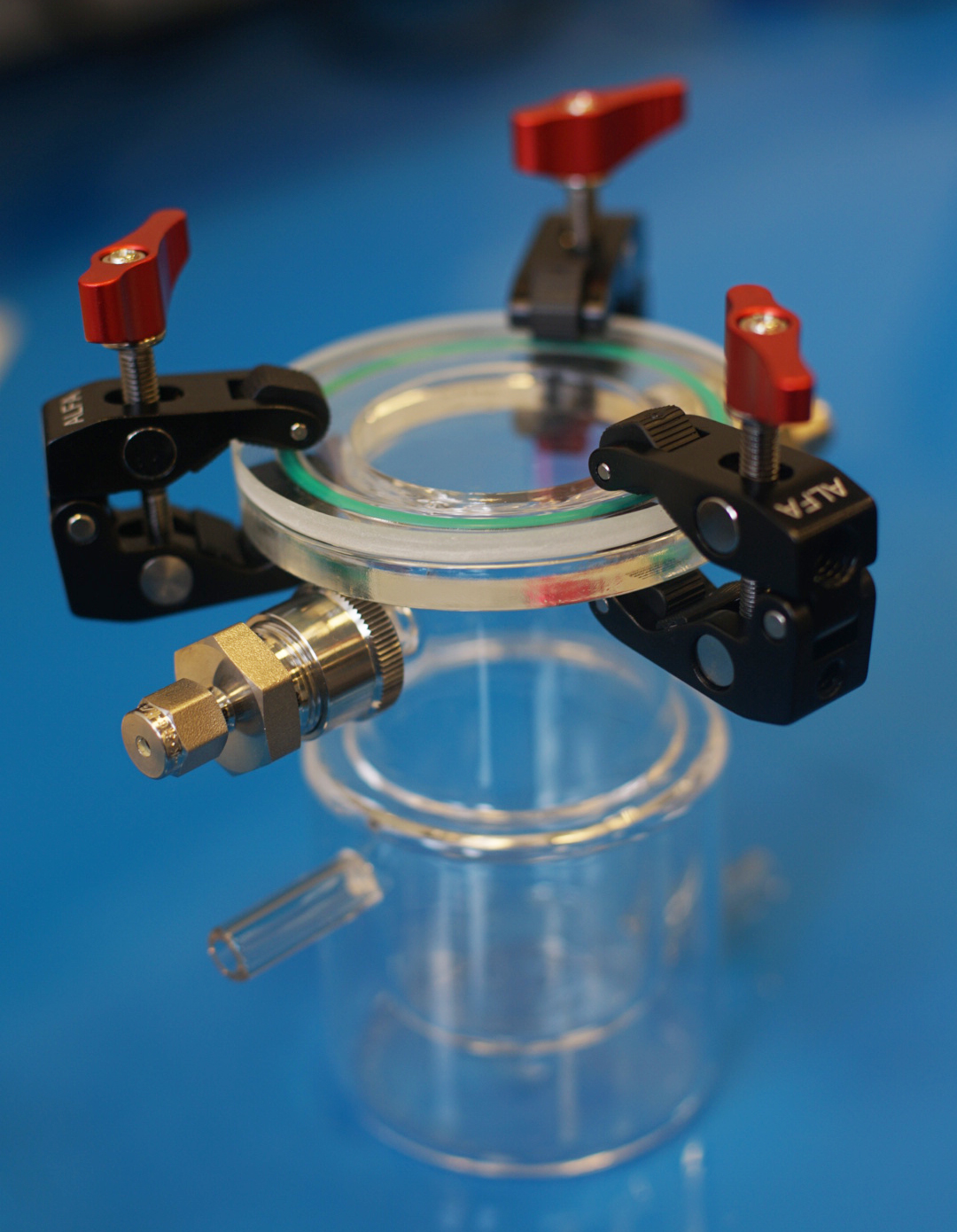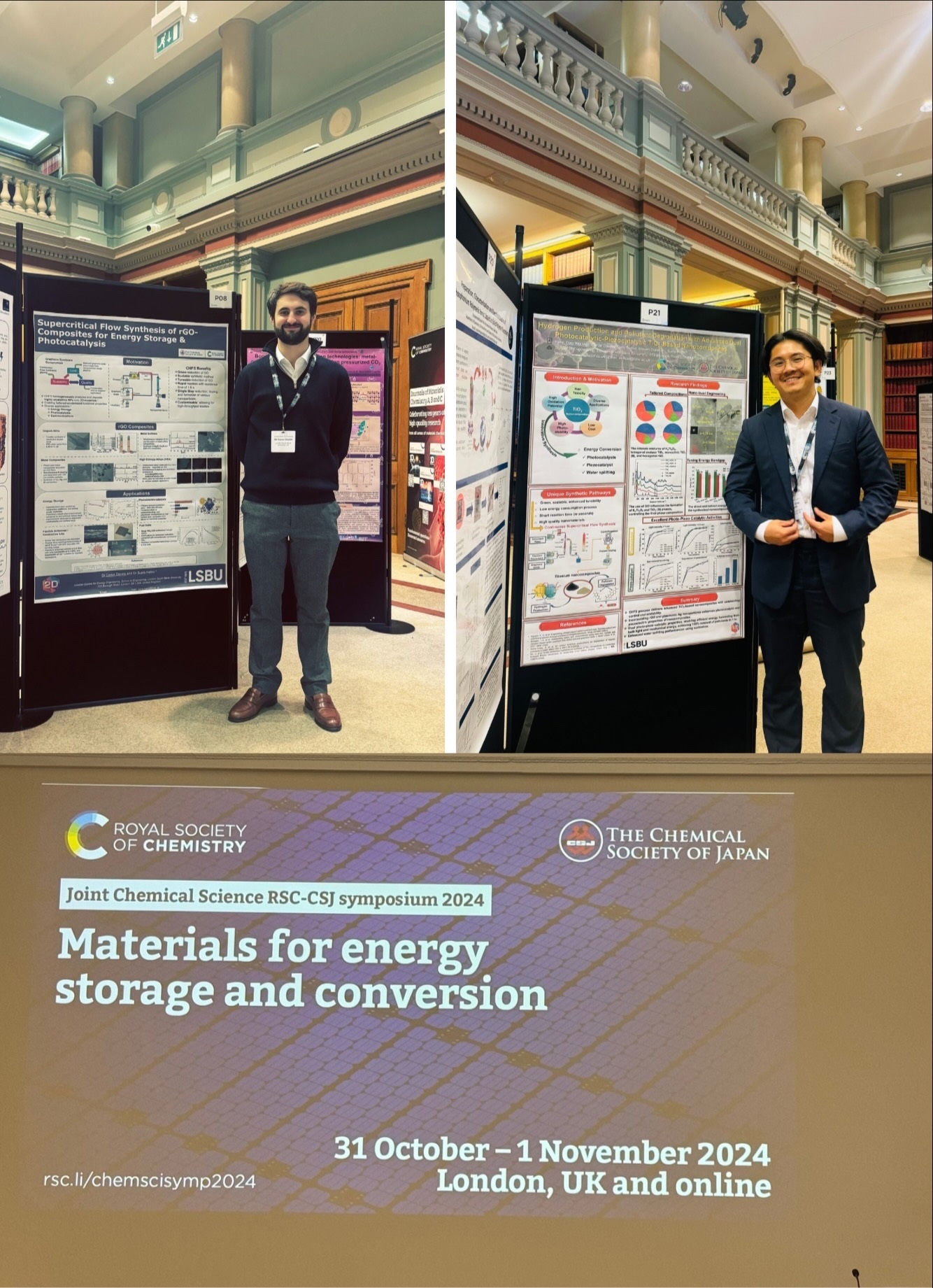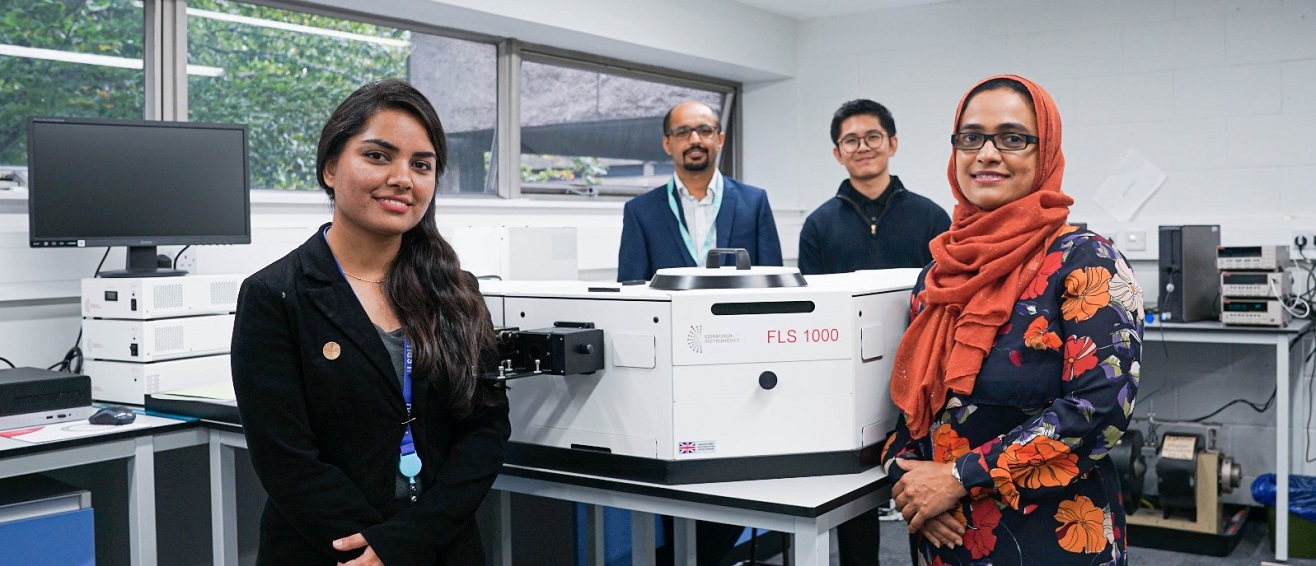
Energy, Materials and Environment Research Centre
- Home
- Research
- Research centres and groups
- Energy, Materials and Environment Research Centre
The Energy, Materials and Environment Research Centre is the focal point for cross-university research interests that are multidisciplinary with a background in the policy governing, societal impacts of, synthesis, optimisation and application of materials and engineering systems for the sustainable use and production of energy.
Our key research aim is to develop whole energy systems to mitigate climate change. We undertake interdisciplinary research focused on the complete energy system, focusing multiscale concepts from materials engineering, policy and governance, storage and demand, across electricity and heat to deliver change in the interplay between energy, economy and society.
We focus on:
- Heating and cooling. Using creative and novel approaches, we have made significant impact in reducing the energy demands for London Boroughs to individual buildings. This covers a whole energy systems approach and is being used to deliver significant improvements in reducing energy demand.
- Materials modelling and synthesis. Here our approach is to develop new approaches to produce common materials more sustainably or develop next generation functional materials for energy storage or energy transformation, such as catalysts.
- The impact of scale. We incorporate the understanding of scale when determining policy or strategy. Our interests cover local, to national and international scales determining local energy policy and decentralised energy options.
- Policy, oversight and international trends are important when considering any national change. We focus on the global policies to deliver low carbon transitions, government policy regarding reduction targets, international climate policy, systems regulation, and evaluate how to add value to local communities through local/national and international trends.
Work with us
Please contact Professor Steve Dunn (dunns4@lsbu.ac.uk) if you would like to know more or have an initial conversation about what solutions we can provide to current problems.
Steering Committee:
- Professor Steve Dunn (Director)
I have a research background in the processing of functional ceramics and hybrid systems and am the current Director of the Energy, Materials and Environment URC, while also being Professor of Materials Engineering. My first degree was in Chemistry from Edinburgh which was followed by a PhD in Materials Science at Cambridge in 2001.
Since then, I have published over 125 publications, a high proportion in high-impact journals such as Advanced Materials and Energy and Environmental Science, supervised 21 PhD students and over 200 3rd year project and MSc students.
My research interests include developing fundamental understanding of carrier lifetime enhancement in functional metal oxide systems. We are currently working on processing of low Currie temperature ferroelectric materials, modifying the surface of ferroelectric materials with oxygen and hydrogen evolution catalysts as well as novel ways to form carbonaceous nanostructured islands.
- Dr Ali Tighnavard Balasbaneh
- Professor Issa Chaer
- Professor Judith Evans
- Professor Yunting Ge
- Professor Saurav Goel
My main research interests are Circular Economy; Construction Management, Sustainability, Life Cycle Assessment, Life Cycle Cost, Social Life Cycle Assessment, Circular Economy, Prefabricated Structural Systems, Offsite Manufacturing, Modular Construction, Engineering Wood, Nearly Zero Energy Buildings, Smart Buildings, and Low Energy Ventilation, Sustainability of Product Technologies.
I am a Chartered Engineer with a BEng (Hons) degree in Mechanical Engineering, a PhD in enhanced heat transfer and over 25 years combined academic, research and industrial experience.
I am a great believer of research informed teaching and have published over 100 research articles, 4 books/book-chapters and developed over 10 academic and CPD courses.
I am currently a Professor and Director of Research and Enterprise for the School of the Built Environment and Architecture.
My research interests include heat transfer, thermal energy systems/networks, alternative and renewable technologies and energy management.
I work on food refrigeration operations throughout the food cold chain from harvest/slaughter to the consumer. During my career, I have worked on a number of topics including frozen storage of meat, consumer handling of food and studies to improve the performance of domestic and commercial refrigerators, energy labelling, instrumentation performance, decontamination of food, cook-chill systems, novel refrigeration systems, optimising refrigeration systems and improving performance and temperature control in chilled and frozen storage rooms.
I am the Professor of Building Services Engineering in the School of The Built Environment and Architecture. I am also the Director of the Centre for Civil and Building Services Engineering (CCiBSE). Previously, I worked periodically as a lecturer, senior lecturer, reader and professor at Brunel University London and the University of South Wales. I gained my BSc, MSc and PhD degrees from Xi’an Jiaotong University (BSc, MSc) and Tsinghua University (PhD) in the field of Thermofluids, Energy, Hydrogen and Built Environment.
My expertise is in precision processing of “difficult to cut materials”. This include their shaping and finishing by both subtractive and additive methods. I use a myriad of techniques to achieve this and it includes micromachining, surface coatings, texturing, surface metrology, mechanical characterisation and modelling activities. By doing so, I aim to create high-quality reciprocal “digital twins” of all these micro/nano scale processes. I am also researching and developing hybrid and sequential manufacturing techniques (laser/ultrasonics). Most recently, I am collaborating with NHS at Milton Keynes hospital to address a global challenge about bacterial infection of medical implants
- Dr Suela Kellici
- Dr Ben Lishman
- Dr David McGovern
- Dr Harry Mohd Radzuan
I am an Associate Professor in Materials Engineering and the Head for London Centre for Energy Engineering. I originally studied at the Queen Mary University in London where I completed a degree in Chemistry and a PhD in Materials Chemistry. Prior to joining LSBU I worked as a Researcher at University College London. I am Fellow of the Royal Society of Chemistry and Higher Education Academy.
My research interests focus on ice, mostly in the Arctic. For several decades, the volume of Arctic sea ice has decreased, and soon there may be only seasonal ice which freezes in the winter and then melts away in the summer. My research ask how we can understand this geophysical development by understanding the basic engineering and mechanics of sea ice.
I am a physical modeler in the fields of Coastal and Ocean Engineering, sediment transport and fluid mechanics, with particular focus on Tsunami and coastal natural hazards.
I have a BSc Environmental Science (2006) and PhD Geography (2011, Scour at offshore Wind Turbines) from Lancaster University.
I spent 2012-2014 as PDRF at the National University of Singapore researching the kinematics of sea ice in waves & impact dynamics with offshore structures.
I joined LSBU in 2024 as a Lecturer in Project Management based in LSBU Business School. I obtained my first degree in Electronics Engineering at IUKL, followed by an MSc in Engineering Management at the University of York. After graduating with a Distinction, I pursued a PhD in Planning and Environmental Management at the University of Manchester with research focusing on renewable energy planning.
Centre Members:
I am a lecturer in the Division of Chemical & Energy Engineering. I joined LSBU in 2023, having previously worked at Imperial College London. I received my PhD in Chemical Engineering from Queen Mary University of London, and my first degree in Chemical-Biological Engineering from Massachusetts Institute of Technology.
I am passionate about sustainable materials because I believe that human and environmental health are not mutually exclusive. To survive as a species, we need to manufacture vital materials without causing irreparable damage to our environment. My research focuses on converting waste biomass to sustainable materials using a technique I call 'waste-negative parallel manufacturing': the co-production of diverse materials from complimentary fractions of biomass, with an emphasis on using more waste than is produced. Cradle-to-grave waste negativity necessitates (1) valorising waste feedstocks, (2) avoiding process waste by recycling reagents and utilising by-products, and (3) ensuring circularity of products.
I am a Senior Lecturer at the School of Engineering in LSBU. I am computational materials physicist interested in modelling the properties of semiconductors and other functional materials. I am fascinated by the interaction of charge carriers with defects in crystalline systems, and aim to understand this interaction at a fundamental level. My work focuses on materials used in energy applications and high power microelectronics.
I am from Cork, Ireland, which is where I studied physics (at University College Cork). After obtaining my PhD, in 2011 I moved to the Chemistry Department in UCL. I moved to LSBU in 2019.
My research focuses on developing and applying computational techniques to understand how defects influence the electronic, optical, dynamic and transport properties of semiconductors. My key interest is to understand these effects at a detailed, fundamental level. Doing so provides insights in materials science which help guide the design of devices for solid-state lighting, microelectronics, sensing and energy applications such as photovoltaics, fuel cells and thermoelectrics.
I am a leading authority on environmental and architectural acoustics. I have written more than 100 scientific papers on architectural acoustics, environmental noise, speech intelligibility, electro-acoustics, sound absorbing materials, metamaterials, urban wind turbines, mathematical modelling, computer simulation, classroom acoustics, and noise exposure. I have taught at the Institute of Sound and Vibration, and at the Royal Academy of Music. I sit on boards and committees for professional bodies, government ministries, and international bodies. I am currently the acoustic advisor to the Royal Opera House
I lead LSBU's research in heating and cooling in the School of Engineering. A fantastic team to work with!
I have worked in the energy sector for 40 years, lead the heating and cooling research team and have over many years actively contributed to the development of the academic discipline. My initial strategy was to focus on reducing carbon emissions associated with refrigeration and air conditioning. This has been successful and has delivered sustained funding over many years. In total, I have secured over 40+ research projects with a combined value of >£15M. Funding has included 8 EPSRC awards and including programme grant ‘LoTNET’, the £5M ‘CryoHub’ award and the recently awarded £4M ‘GreenSCIES’ project.
I am a Professor of Building Decarbonisation and Director of the BSRIA LSBU Net Zero Building Centre. The Centre is a joint venture between BSRIA and LSBU with the aim of accelerating decarbonisation in the built environment.
My research interests centre on the UK energy trilemma of delivering a low cost, low carbon, secure energy system. I am particularly interested in the field of low carbon heat and the intersection of technical and policy challenges in meeting the UK’s 2050 carbon targets.
My research background considered domestic retrofit programs and policy implementation. From February 2017-18 I worked with the Department of Business, Energy, and Industrial Strategy (BEIS) on secondment to the Energy Transformation Directorate. My role was supporting and developing technical research to inform policy design.
My research interests and expertise focus on several interrelated themes central to construction management, such as the application of digital technologies in urban simulation, negotiation, and collaboration to facilitate procurement decision-making in the supply chain, knowledge management in improving the procurement and performance of construction projects and modern construction management techniques and sustainable development. I have a broad background in conducting multi-disciplinary research involving many research teams in urban/building simulation and project management. My research-driven career within higher education spans more than 18 years. I have contributed to four books and more than 100 international journals and conference publications. I have also supervised over seven PhD students and examined over 25 candidates.
My diverse experience in industry and academia has helped me develop a wide range of interests. I am particularly passionate about addressing some of the most pressing global challenges, such as plastic waste pollution and global warming. As a result, my main research interests include green and sustainable chemistry and engineering, chemical recycling, renewable energy, lithium-ion batteries, and applied thermodynamics.
I am an Associate Professor of Energy Engineering and Materials Devices in the School of Engineering. Before joining LSBU in 2019, I worked at the Organic Semiconductor Centre, University of St Andrews, UK. I received my MSc in Electrical and Electronic Engineering and PhD in Photonics from the Advanced Technology Institute, University of Surrey, UK.
Significant partners and funders include Big South London, The Borough of Southwark, The Greater London Authority, Social Prosperity Fund, The Social Prosperity Fund, The Royal Society, Innovate UK, EPSRC and The Leverhulme Trust.
Recognising the significance of the centre's cutting-edge, field-leading research programmes, we have been the partner of choice with substantive and effective relationships, including the Boroughs of Islington, Southwark, Croydon and Sutton, and industry such as NSG-Pilkington, Airbus, P&G and E-ON. Our research has been funded by UKRI, EPSRC, UKERC, InnovateUK, European Commission and industrial partners. The global reach of the centre is shown by collaborative grants between partners in 14 countries. Our teams have worked with national (including Johnson Matthey, Imperial, Bath, QMUL, St Andrews, UCL) and international (including Centi, Fraunhofer, ETH Zurich, Max Planck Institute, VITO) partners to deliver multimillion projects (totalling £34m).
In the last five years, the centre members have published over 400 papers with collaborators from 41 countries including India, USA, Switzerland and Singapore with fellowships such as MSCA and Royal Society. A key pillar to the unit’s objectives is exploitation and commercialisation of our research excellence into enterprise activities. To this end we have supported the granting of patents and enabled spin-out activities. One such example is PEG a University spin out that aims to capture vibration to power next-generation internet of things devices funded by Innovate UK. Centre members collaborating across LSBU are is currently involved in multiple Social Prosperity Fund programmes supporting London’s SMEs from a range of sectors, including low carbon and energy. So far, we have supported over 1,000 SME in greater London. This supports our ambition to engage with and develop relationships across academia, business, and society, with our strategic aim of ‘real world impact’.
The Centre's updates and news items....
| 16th December ~ funded project Department for Science, Innovation and Technology’s International Science Partnerships Fund |
|---|
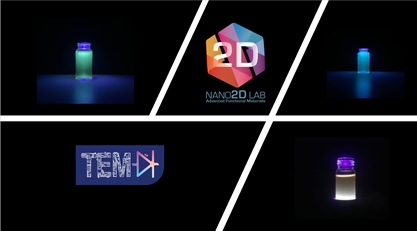 |
Tariq Sajjad and Suela Kellici have secured an international research collaboration grant to tackle food shortages via innovative materials and technologies. Our team, alongside ITU (Turkey), will develop cutting-edge nanofertilizer and nano-optical antennas. This funding, has been awarded through the Department for Science, Innovation and Technology’s International Science Partnerships Fund, supporting international research partnerships. |
| 12th December - Energy Advice Centre |
|---|
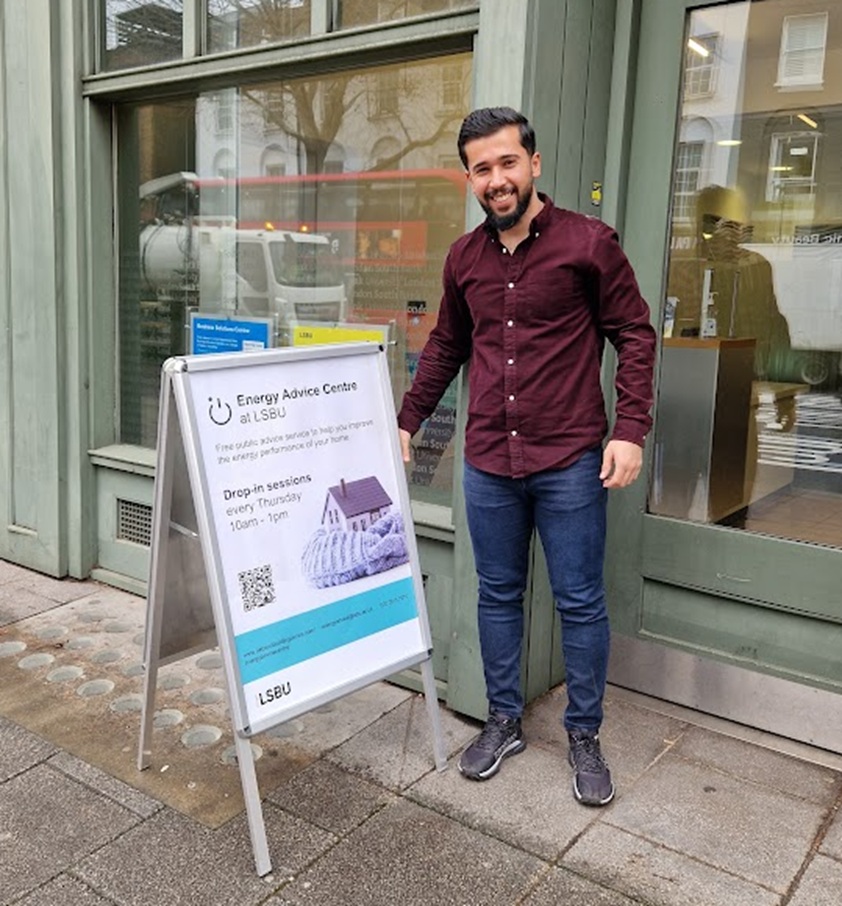 |
The LSBU Energy Advice Centre is a student-led initiative to help our local community save money on their energy bills. We opened at the start of January 2023, and since then we’ve given bespoke advice to hundreds of Londoners. We had always hoped that the EAC would bring benefits to our students and to people who live in South London, and since we opened these have gone far beyond our expectations.
You can find us at https://www.netzerobuildingcentre.com/energyadvicecentre, or email us at energyadvice@lsbu.ac.uk, or come and visit us any Thursday morning between 10am and 1pm at our drop-in clinic at 126 London Road, SE10AE. We’ll be delighted to help you save energy in your home. |
6th December - EPSRC Awards Two-Year Bridging Funding for CCP-QC: John Buckeridge to Co-Chair and Lead Electronic Structure Project |
|---|
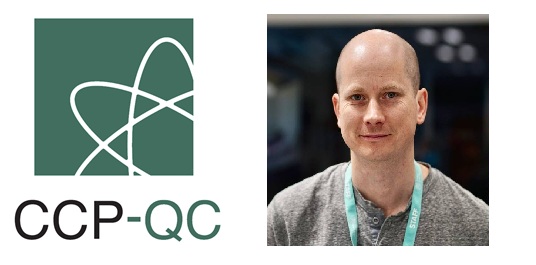 |
We have been awarded two years EPSRC bridging funding to continue our work for the collaborative computational project in quantum computing (CCP-QC). John Buckeridge will co-chair the CCP and lead the electronic structure project with Computational Science Centre for Research Communities (CoSeC) support from Science and Technology Council ( STFC). |
| 22nd November ~ Thermafy visit to discuss energy efficiency |
|---|
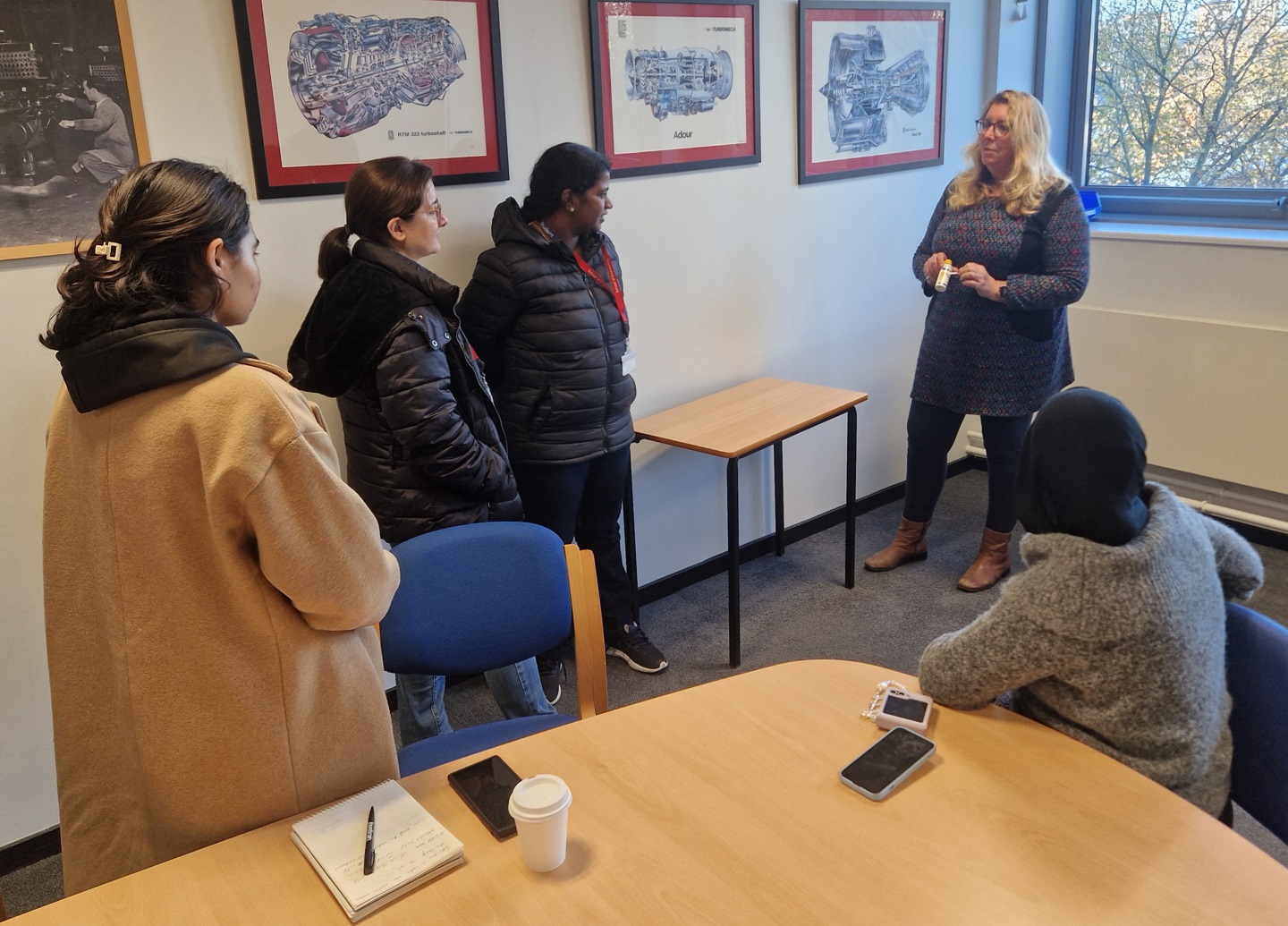 |
Students working at LSBU's Energy Advice Centre are collaborating with Thermafy, a Scottish SME, to develop new methods for home efficiency assessments. On the 20th of November, Thermafy's CEO and CIO came to deliver training to our Energy Advice team on how to use smartphone tools to conduct in-home energy efficiency surveys. Thermal cameras can be used to find inefficient radiators, and lidar-based mapping tools can feed into automatic heat loss calculations. The outcome is a set of simple steps that residents can follow to reduce their bills. Kristina Kerwin, PhD student and Director of the Energy Advice Centre, said: "We'd like LSBU to be a pioneer for domestic efficiency, and our target is to offer in-home assessments to all LSBU staff and students, which will improve efficiency for thousands of homes in London. The training with Thermafy was fun and inspiring, and showed us the tools and skills that we need to maximise what we can do. We're looking forward to putting this into operation." LSBU are keen to work in partnership with other universities to build a nationwide network of student experts. If you're interested in finding out more, email us on energyadvice@lsbu.ac.uk. |
| 18th November ~ Paper published in International Journal of Hydrogen Energy |
|---|
| Hydrogen and metal hydride reactions in a decarbonized heat pump system with low-grade waste heat recovery offer a promising path for sustainable energy storage and conversion. Based on actual metal hydride reactor designs, this study developed a 2D transient Computational Fluid Dynamics (CFD) model for such a heat pump system working with hydrogen and a metal hydride alloy pair of Zr0.9Ti0.1Cr0.6Fe1.4 and LaNi4.25Al0.75. The effects of operating temperatures on the coefficient of performance (COP) and specific heat power (SHP) of the system have been presented and analyzed. Subsequently, raising the medium-temperature heat sink (TM) from 358.15 K to 373.15 K, and low-temperature heat source (TL) from 308.15 K to 323.15 K, results in a decrease in the COP by 25.57%, and an increase in the COP by 38.2%, respectively. An optimum value of high-temperature heat source (TH) exists at 493.15 K for a maximum COP. In addition, the higher thermal conductivity increases the absorption and desorption capacity of hydrogen. |
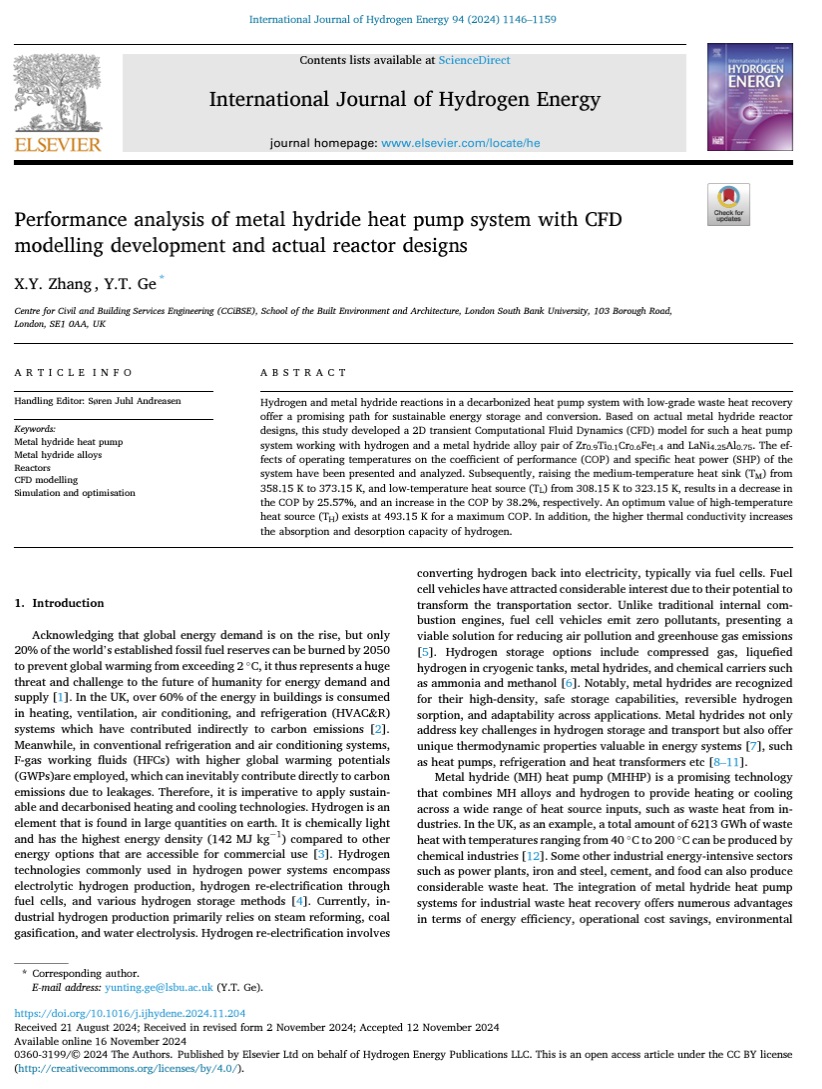 |
| 14th November ~ Major international award won |
|---|
Working with, University of New South Wales (Sydney -Australia), The Open University, The Technical University of Delft (Netherlands) and Universitas Syiah Kuala (Indonesia) LSBU’s Dr David McGovern and Dr Keith Adams have received a prestigious international award in Tokyo recognising their 20 years of research in tsunami engineering and coastal risk assessment. Sea level rise (SLR) due to climate change (CC) is putting coastal regions at risk of severe flooding. Seawalls defending coasts will require retrofit to mitigate SLR and extreme wave climates (EWC) associated with CC. Decisions on retrofit, reconstruction and abandonment of seawalls worldwide must be made with equitable consideration of key variables beyond only physical/engineering metrics of vulnerability. Failure to do so may result in inequitable investment and mitigation responses to SLR, further exacerbating vulnerabilities for people already disproportionately exposed to climate risks due to characteristics such as income, gender and ethnicity. |
 |
| 11th November ~ PhD Role Models for Women in Engineering and Technology |
|---|
On November 6th, we hosted the annual Women in Engineering and Technology event for the third consecutive year! This event is a wonderful opportunity to meet passionate students and inspiring role models in the field, with over 80 students from universities across the UK on-site at our beautiful London Hub, and more than 600 joining us online. The highlight of the day was the insightful discussion by Ellie Martin, who shared her PhD journey, illustrating the vital role PhD students play in shaping the future of engineering. Abinaya Krishnamurthy and Sean Doidge supported on the day and engaged with many students during the networking event. We look forward to continuing to highlight the importance of PhD role models and fostering connections within the engineering community! |
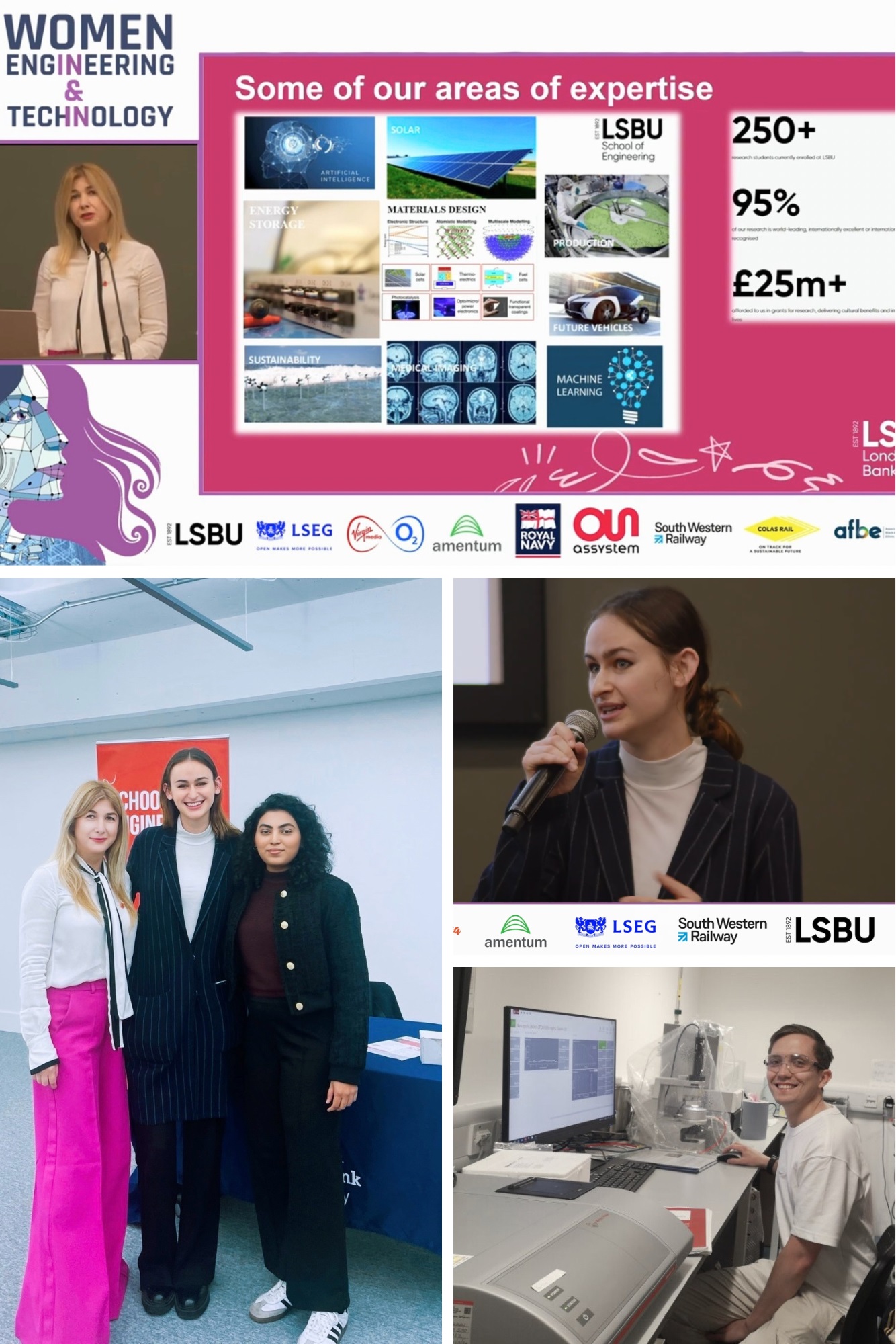 |
| 8th November ~ Paper published in Materials Today Advances |
|---|
| The quest to develop high-performance metallic alloys with properties superior to traditional alloys has driven scientists to synthesize numerous chemical alloy compositions over the past few decades. However, many of these compositions heavily depend on strategic and critical raw materials (S&CRMs), leading to significant environmental impacts due to intensive mining practices. Through this work, we present a scientific rationale to highlight that high performance in metal alloys can be achieved through strain engineering approach, which is a sustainable alternative to reduce the use of S&CRMs. Strain engineering refers to the process of deforming materials to induce changes in their microstructure, such as increasing dislocation density, promoting twinning, forming ultra-fine grained (UFG) or nano-crystalline (NC) structures, and in some cases, triggering phase transformations like transformation-induced plasticity (TRIP) and twinning-induced plasticity (TWIP) to enhance its properties. |
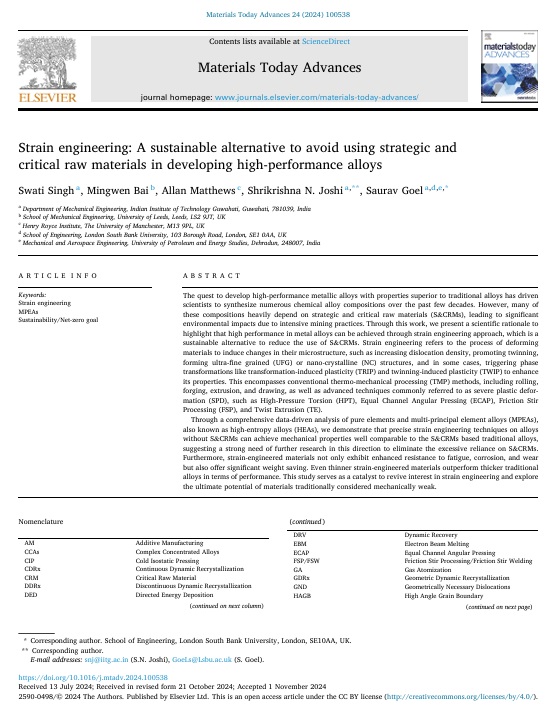 |
| 4th November - Out and About |
|---|
Our team, comprising Dr Suela Kellici, Dr Kiem Nguyen and Dr Conor Davids attended and presented their research at the joint Royal Society Chemistry- Chemical Society of Japan Symposium on "Materials for Energy Storage and Conversion" in London from 31st October 31st - 1st November 2024. Their presentations highlighted significant findings in energy materials, contributing to the ongoing discourse on advancements in energy storage and conversion technologies. This participation also strengthens our collaboration with national and international researchers in the field. We look forward to the advancements that will arise from this valuable exchange of knowledge.
|
Forging sustainable futures: Dr Kellici at UK-Cyprus Research Event Dr. Kellici attended the UK-CY Research Partnering Event in October, 2024, in London, organized by the British Council. The event brought together experts and diplomats from the UK and Cyprus to discuss advancements in energy and environmental materials. Dr. Kellici discussed collaboration and potential research partnerships, focusing on advanced materials in energy, environment, and sustainability. The event offered valuable opportunities for networking and cross-border cooperation. |
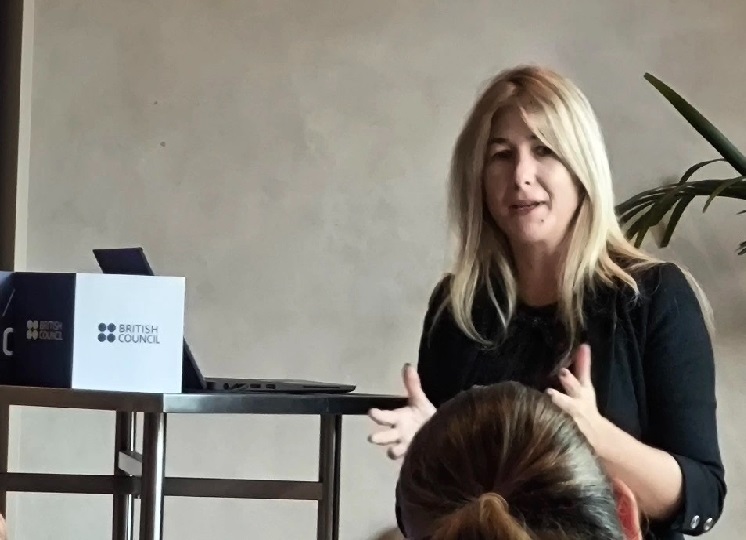 |
| 30th October - Paper published in Journal of Manufacturing Processes |
|---|
| Single point diamond machining (SPDM) produces smooth machined surfaces that other production methods cannot match. While the mechanics of machining of cast alloys with SPDM is well-explored, the realm of SPDM for additively manufactured parts remains largely uncharted. This work reveals new insights into the surface generation process of an additively manufactured titanium alloy, specifically, a Ti6Al4V Extra Low Interstitials (ELI) alloy workpiece. Our examination of the chip morphology unveiled a distinct mode of chip removal, previously unrecorded in existing literature. During SPDM of additively made Ti6Al4V ELI workpiece, identification of numerous pores and discontinuities in the chips flowing on the tool rake face, indicating periodic intermittent cracking during the material's plastic flow was seen. To examine this phenomenon, a finite element analysis (FEA) model was developed. While the FEA model can well explain the machining mechanics and chip morphology of SPDM of cast Ti6Al4V ELI reported in the literature, it failed to describe the chip morphology that are obtained during machining of additively made workpiece in this work. |
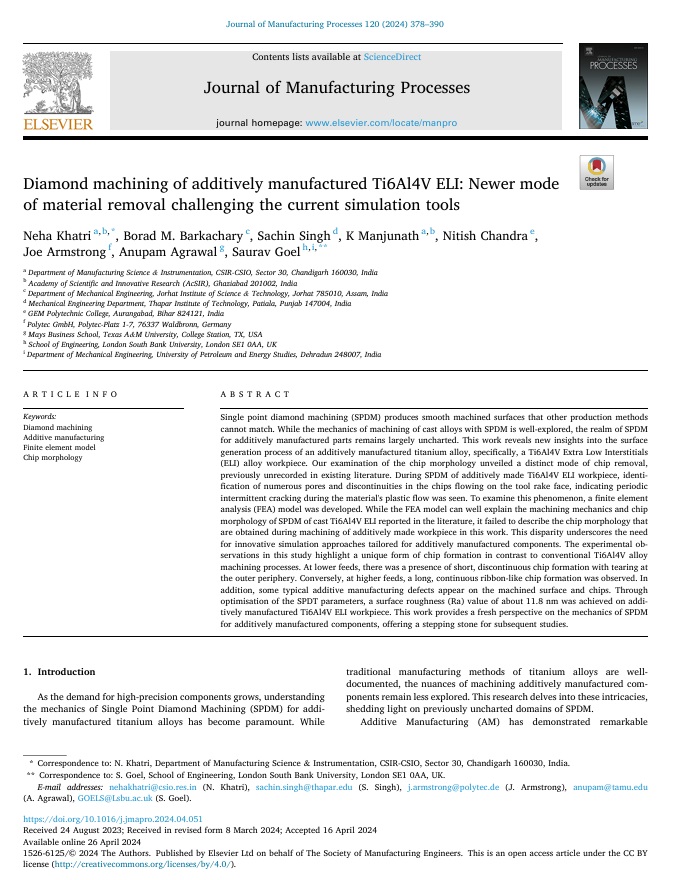 |
| 29th October- Paper published in Advanced Materials Technology |
|---|
| This work presents the development of fully printed, large-area, semi-transparent Dye-Sensitized Solar Cells (DSSCs) using TiO2 nanoparticles treated with TiCl4, a “D35” push-pull dye sensitizer, and I3−/I− redox mediator. Cells with areas of 4 and 200 cm2 were printed using hexagonal, stripe, and standard designs, employing digital materials deposition (DMD) technology. The porous films printed via DMD, confirmed by scanning electron microscopy (SEM), improved solar cells performance by enhancing the Open Circuit Voltage (Voc) and fill factor (FF). The hexagonal design, in particular, facilitated better electrolyte impregnation in the TiO2 mesoporous structure, boosting current density. This design yielded a power conversion efficiency (PCE) of 7.05% for 4 cm2 DSSCs, surpassing the stripe (5.50%) and standard (5.48%) designs. Its higher performance can be attributed to lower interfacial charge recombination rates and improved charge transfer and collection efficiency. Photophysical measurements indicated faster charge transfer rates in hexagonal cells (≈ 1.3 × 109s−1) compared to the stripe (9.8 × 108 s−1) and standard (9.5 × 108 s−1) designs. Hence, our work highlights the potential of hexagonal design to improve both efficiency and transparency while reducing material consumption, offering a promising approach for manufacturing semi-transparent solar cells. |
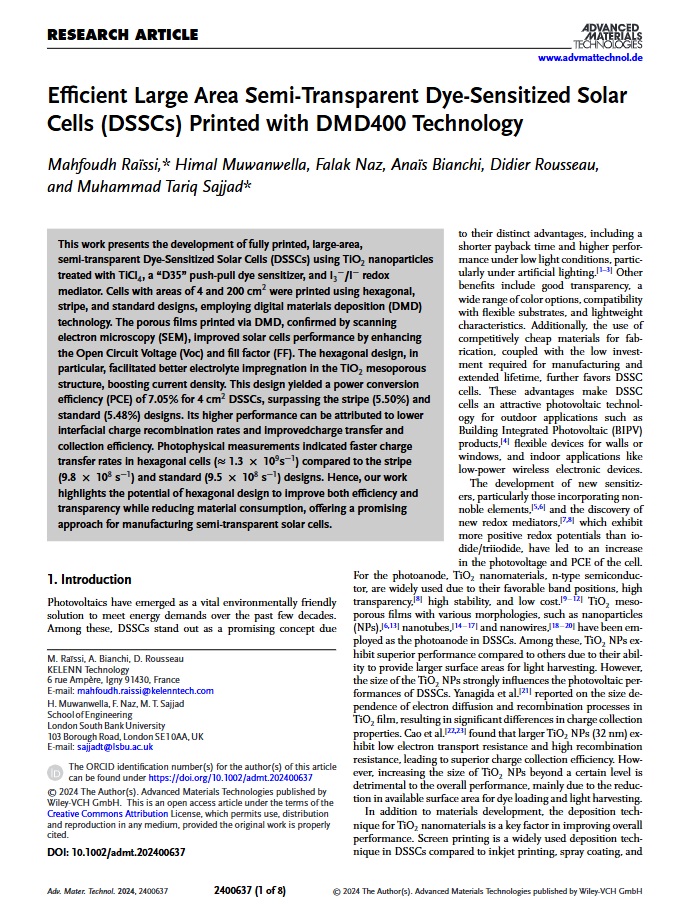 |
| 24th October - Paper published in Applied Thermal Engineering |
|---|
| To improve the output characteristics of seawater desalination-solar chimney power plants, enrich the theoretical research basis and promote its commercial application, this paper introduces the concept of multilayer flow channel, establishes four new types of multilayer collector flow channel, and constructs the corresponding heat and mass transfer mathematical models, revealing the mechanism of the influence of different flow channel and structural parameters on the system performance. The results showed that the surround-flow system extended the heat absorption time of the airflow, had two thermal storage layers, and had the best performance. |
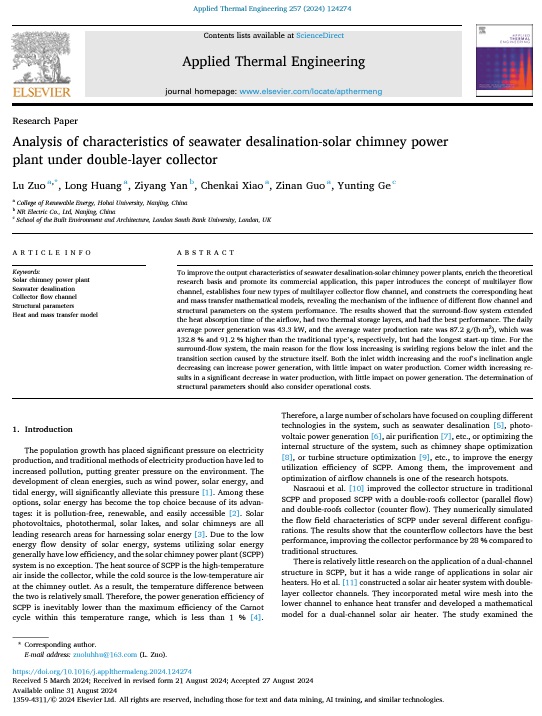 |
| 23rd October 2024 ~ Graduation of School PhD students |
|---|
| As part of the School of Engineering's graduation we saw PhD students associated with the University Centre graduate. A big congratulations to Conor, Guru and Kiem... Well done! |
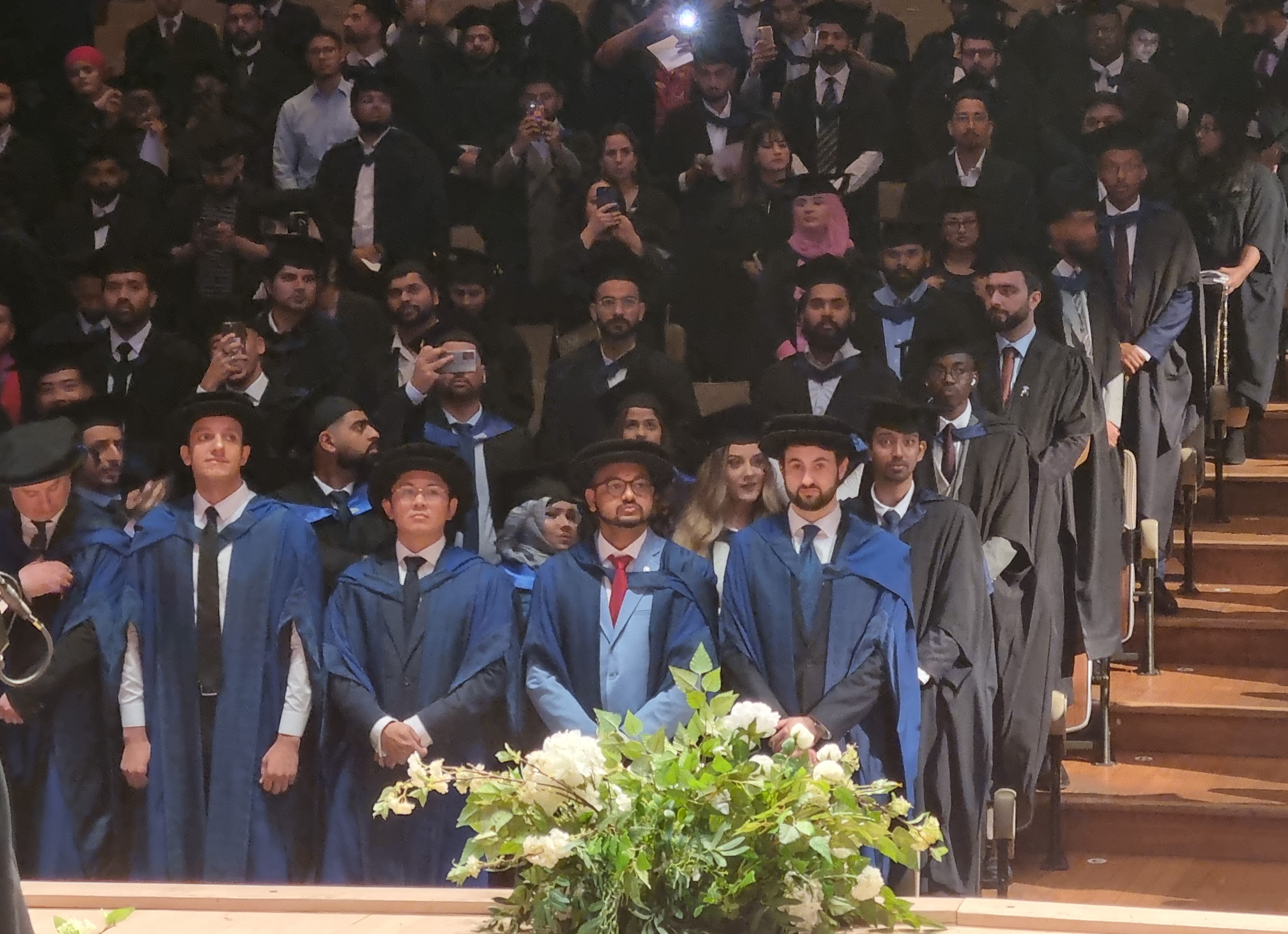 |
| 18th October 2024 ~ Paper published in Advanced Sustainable Systems |
|---|
| Piezocatalysis has emerged as a promising field of research that uses mechanical energy to drive a chemical change. There is growing evidence that piezocatalysts can perform challenging chemical conversions from organic transformations to water splitting. A key challenge to piezocatlaysis is mitigating the inherent high relative permittivity of a ferroelectric material. This high permittivity restricts the transfer of carriers required for a chemical reaction to occur and reduces the reaction rate. Here the concept of producing a co-catalyst system is taken to enhance carrier mobility increasing the observed reaction rate. The study highlights the importance of determining the sonochemical and piezocatalytic contributions to catalysis. |
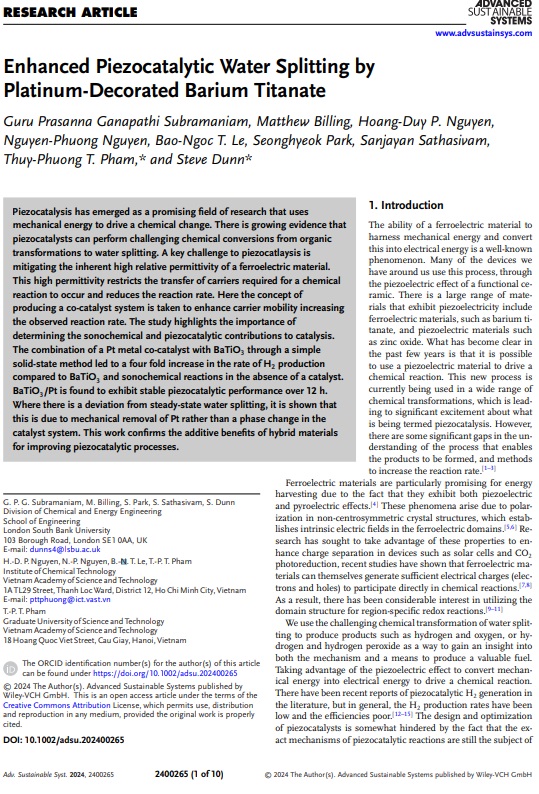 |
17th October 2024 ~ Paper Published, invited article in Carbon |
|---|
A study led by LSBU in collaboration with the National Institute of Materials Physics (Romania), National Institute of Chemistry (Slovenia), The Open University (UK), and the Max Planck Institute (Germany) reveals a unique approach to controlling the optoelectronic properties of nitrogen-doped carbon quantum dots (NCQDs) using biomass-derived precursors. The method employs a green, rapid continuous hydrothermal flow synthesis (CHFS) to transform complex biomass sources like chitosan and lignin into high-quality NCQDs. This research combines in-depth experimental photophysics characterization with theoretical modelling, demonstrating that precursor structure significantly influences NCQD size and optical properties. Life cycle assessments confirm that CHFS is a sustainable and scalable alternative to traditional batch methods, paving the way for economically viable large-scale production. |
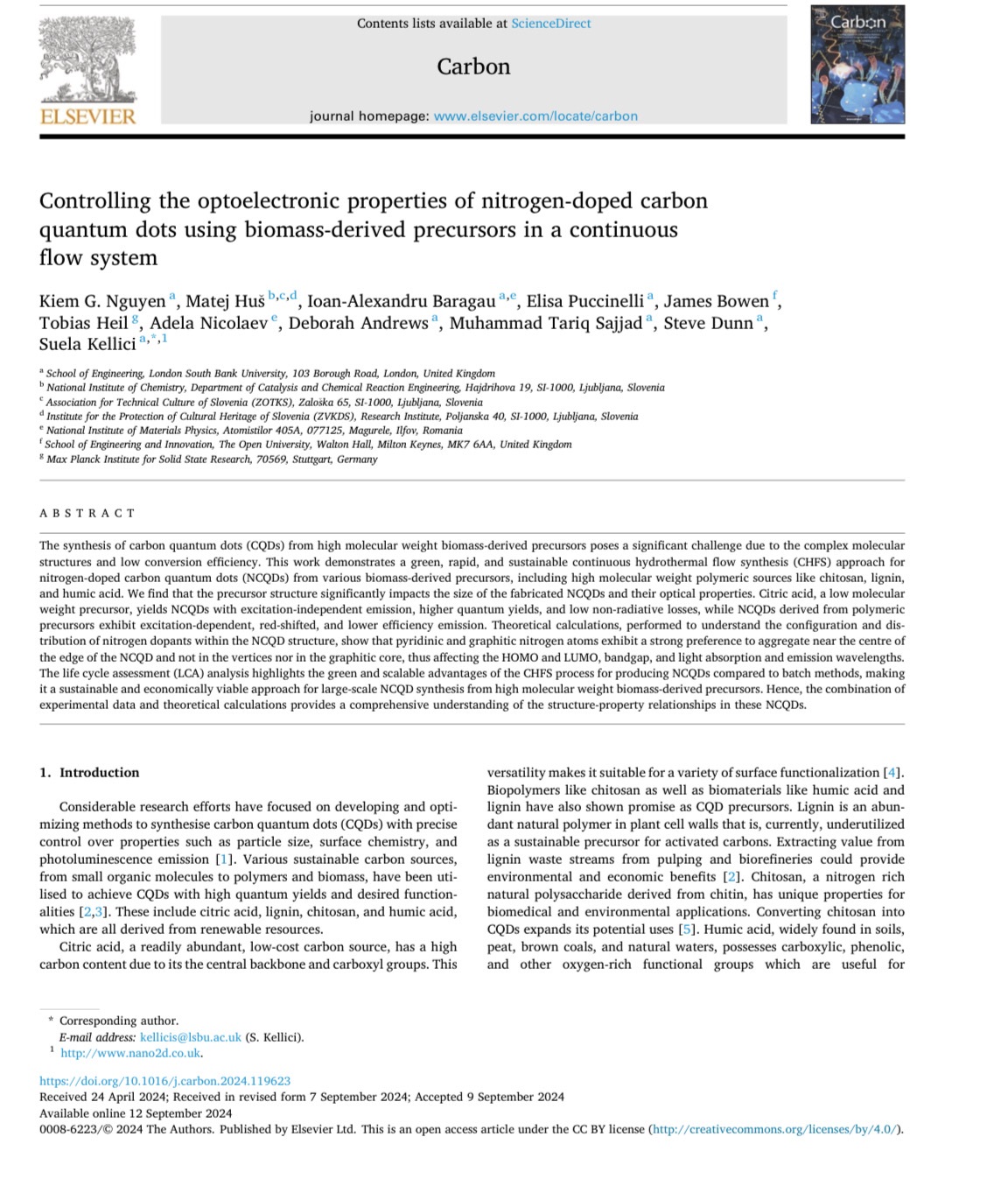 |
15th October 2024 |
|---|
Our first item of news is the 'going live' of the Energy, Materials and Environment (EME) University Research Centre. Our ambition is to become a go-to centre for external and internal stakeholders with an interest in shaping the sustainability agenda through sustainable use of materials and energy. We can provide business to business consultancy, project management and input on device design for a range of end-user applications. |
Consultancy Services
Our engineering labs offer cutting-edge equipment and multidisciplinary expertise to support your business's innovation and development needs. Partner with us to enhance your capabilities and achieve impactful results.
Click to access LSBU’s engineering analytical facilities for advanced material and device characterisation.
Computational Material Design for Energy
Employing a target-orientated approach, we rationally design and manufacture materials aiming to deliver world class materials engineering.
to We use in-house supercomputers, and have access to national high performance computing resources. We are also active in developing sustainable computational techniques.
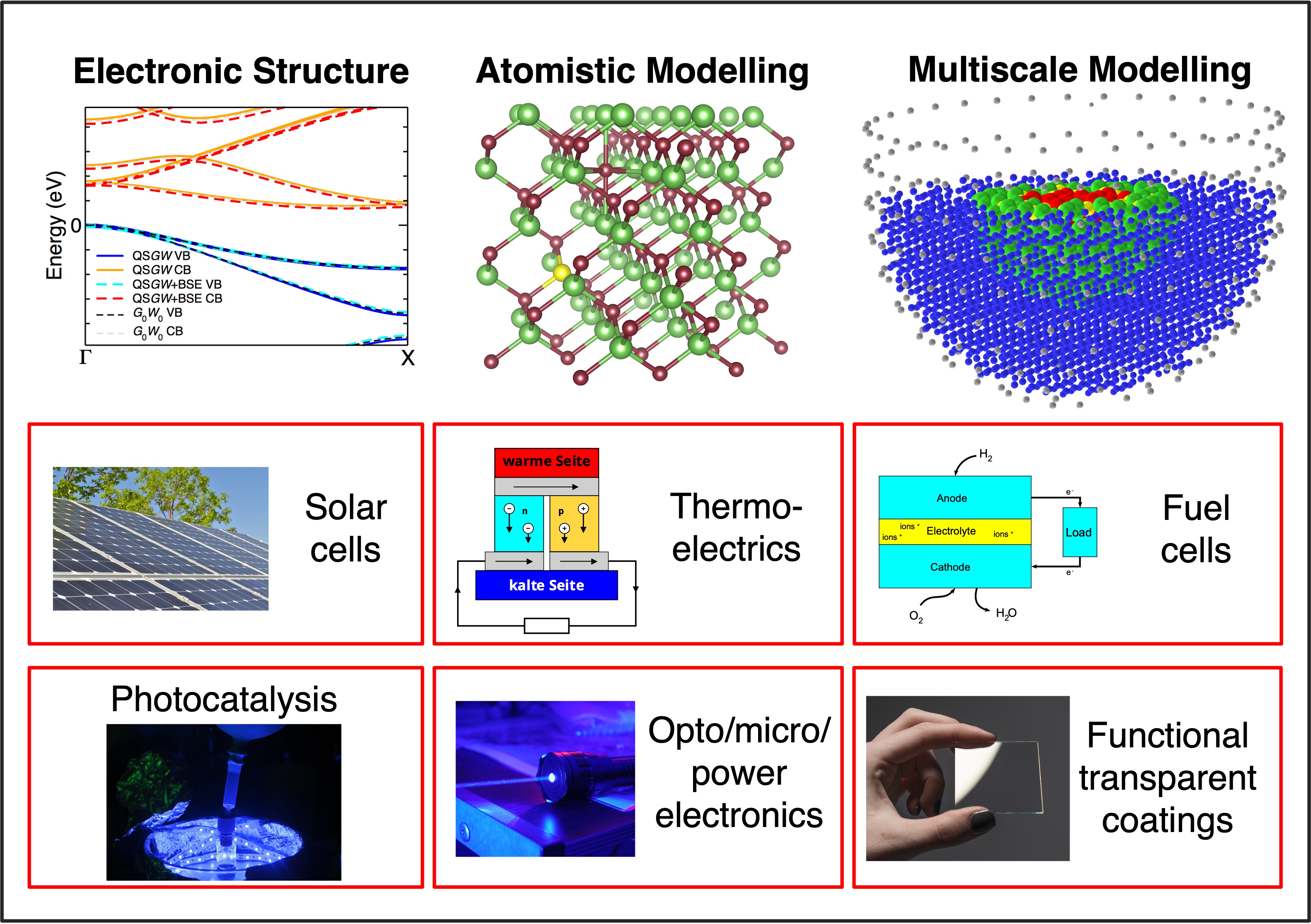
Materials Synthesis
We have established expertise in a variety of materials synthesis techniques from optimised conventional routes to green continuous synthetic processes, e.g., continuous hydrothermal flow synthesis, processes that enable a step change in cost, materials performance and durability.
Our materials portfolio includes an array of functional metal oxides (homo/hetero), metals, quantum dots (e.g. graphene, biomass derived carbon quantum dots) and 2D (e.g. graphene, MXene) hybrid structures.
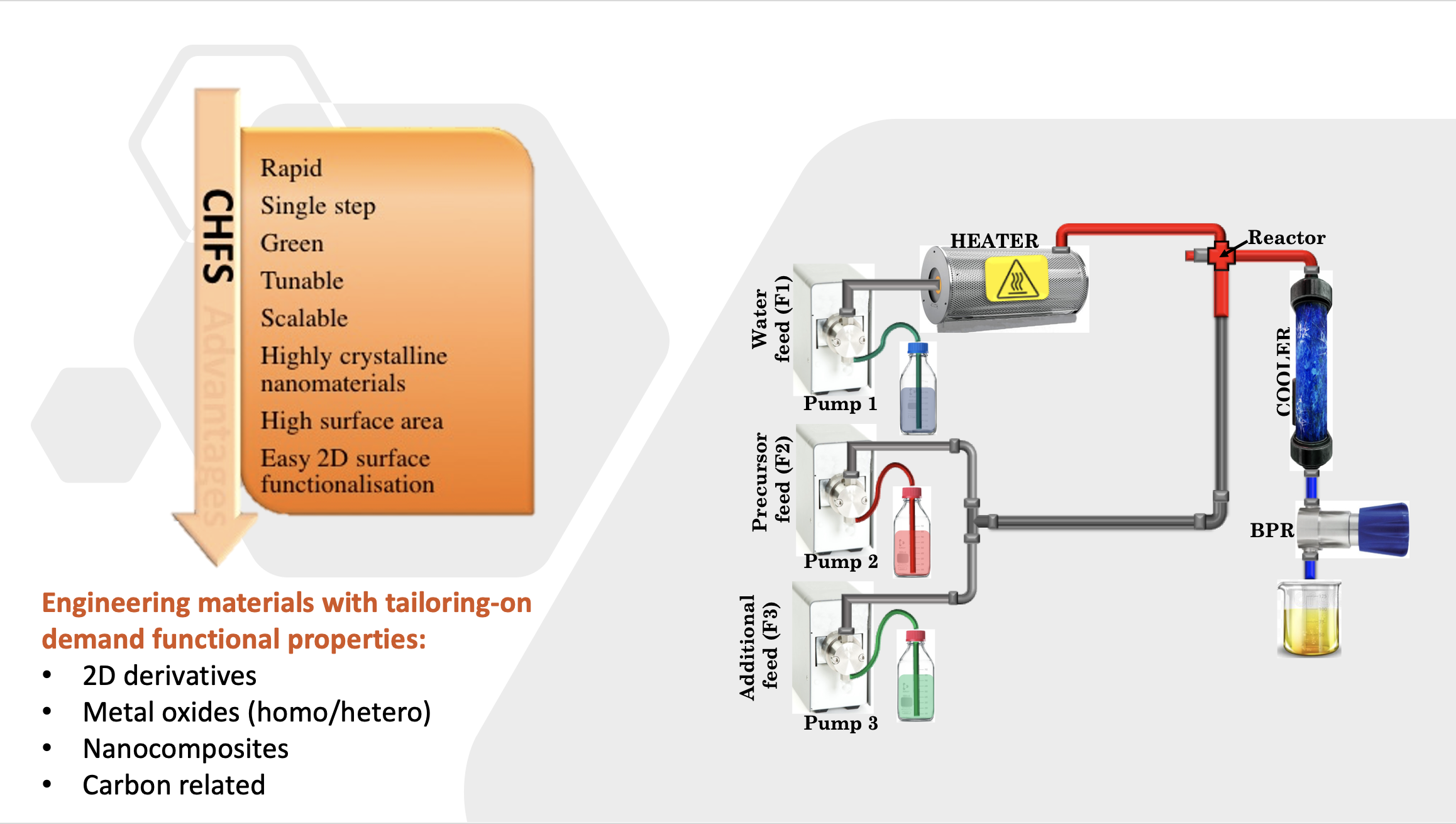
Materials Characterisation

Structure and Morphology
XRD, SEM, FTIR, BET surface area, Profilometer, AFM
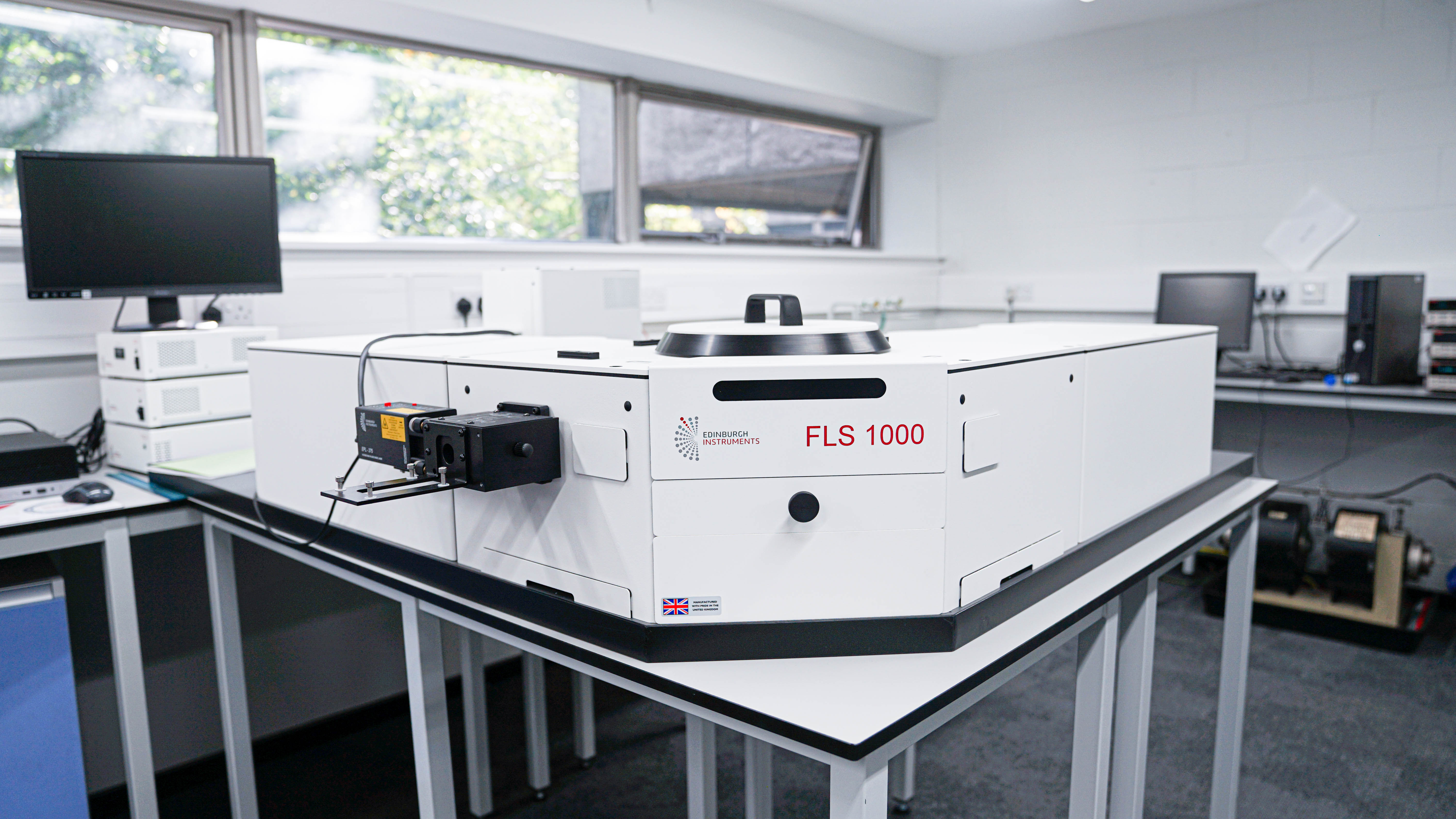
Optical
PL (Steady state and time-resolved photoluminescence spectroscopy), UV-vis, Ellipsometer
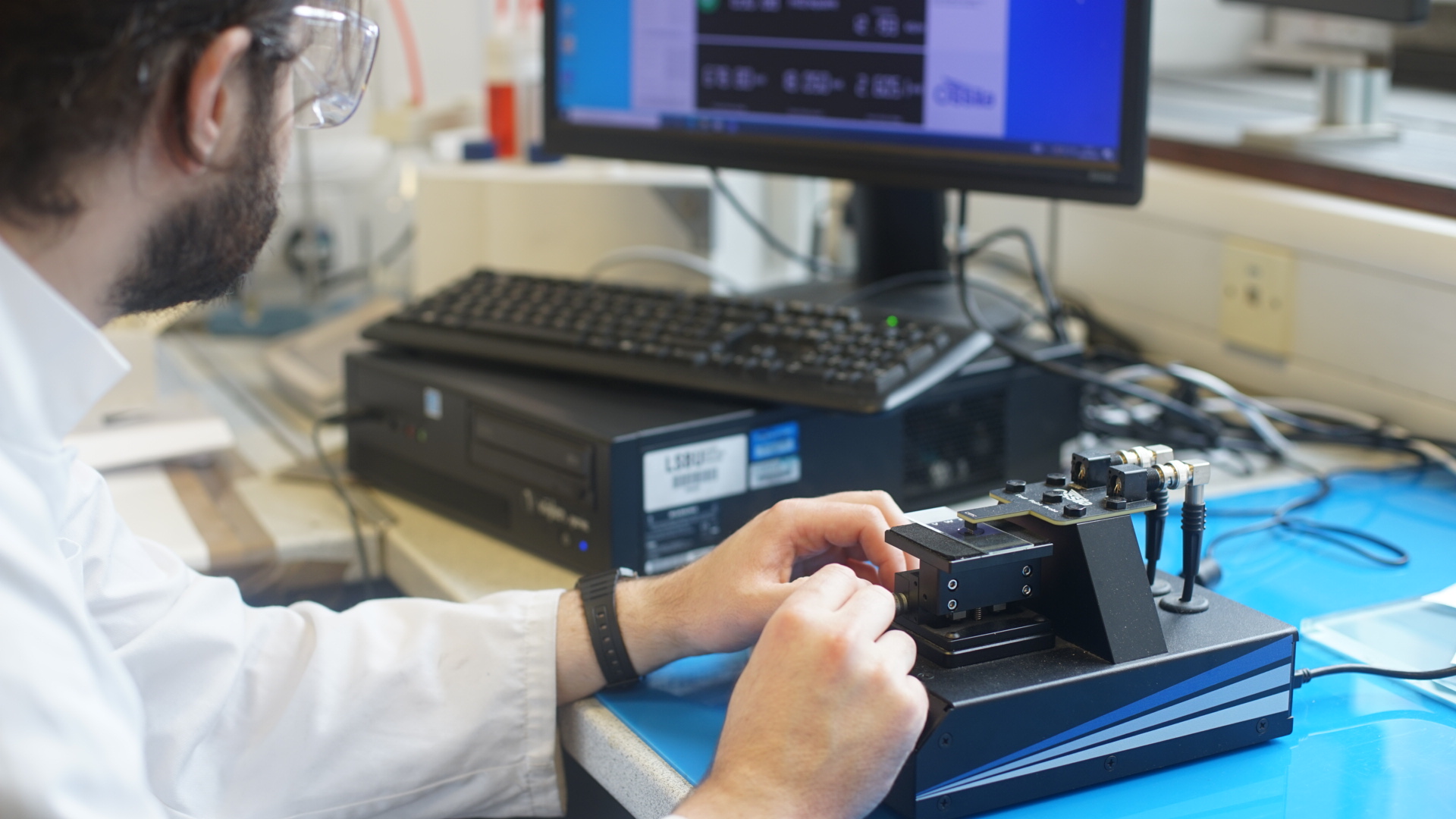
Electrical
Four point probe, Quantum Hall measurements
Device Fabrication and Performance Testing
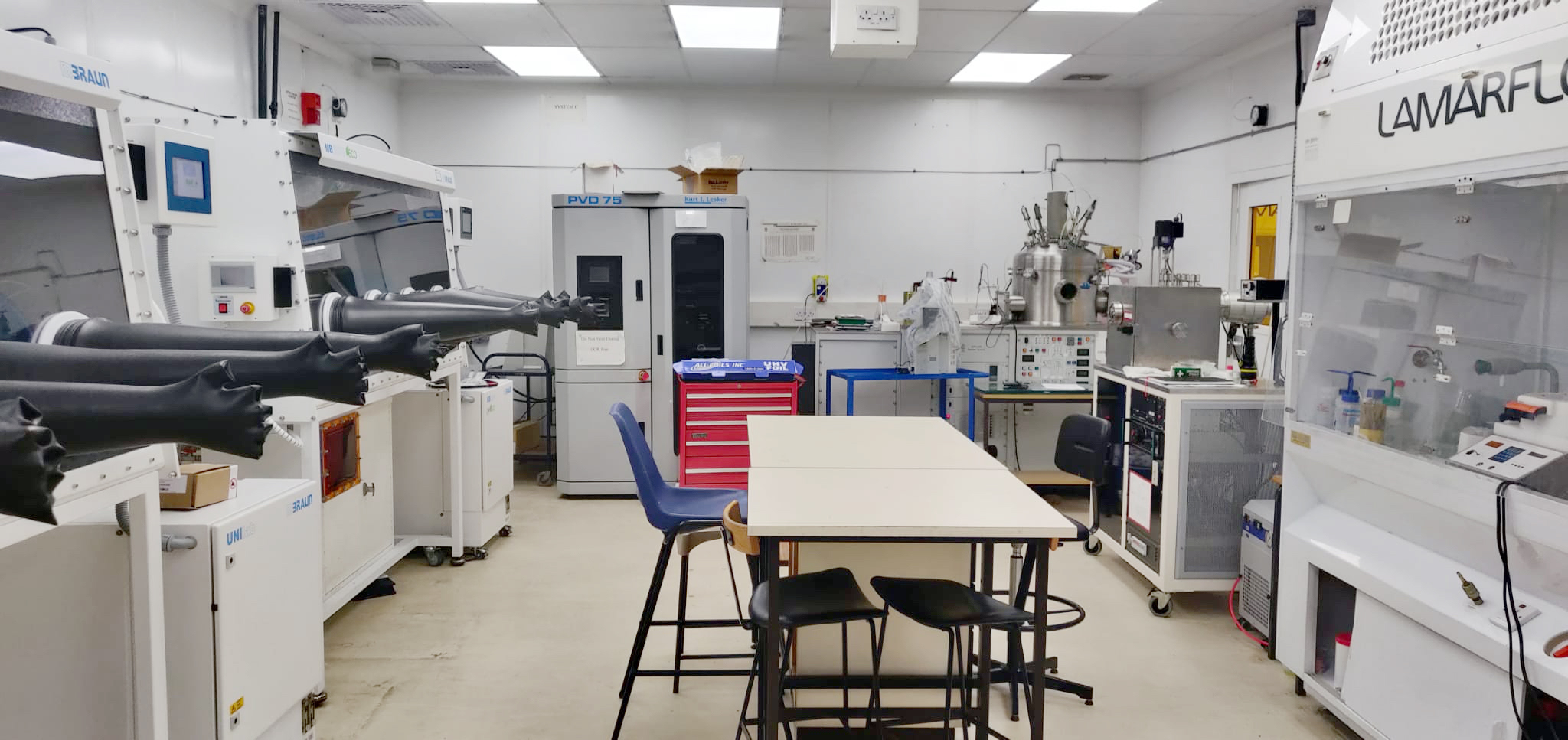
Clean Room
Our clean room is equipped with multiple state of art glove boxes, allocated to the research on photovoltaics, perovskite solar cells and energy storage (battery/supercapacitor)

PV Solar Cells
Photovoltaics solar cells

LEDs
The MADD has facilities to characterise the performance of light-emitting devices (LEDs) and other electronic devices.

Solar Fuel Testing
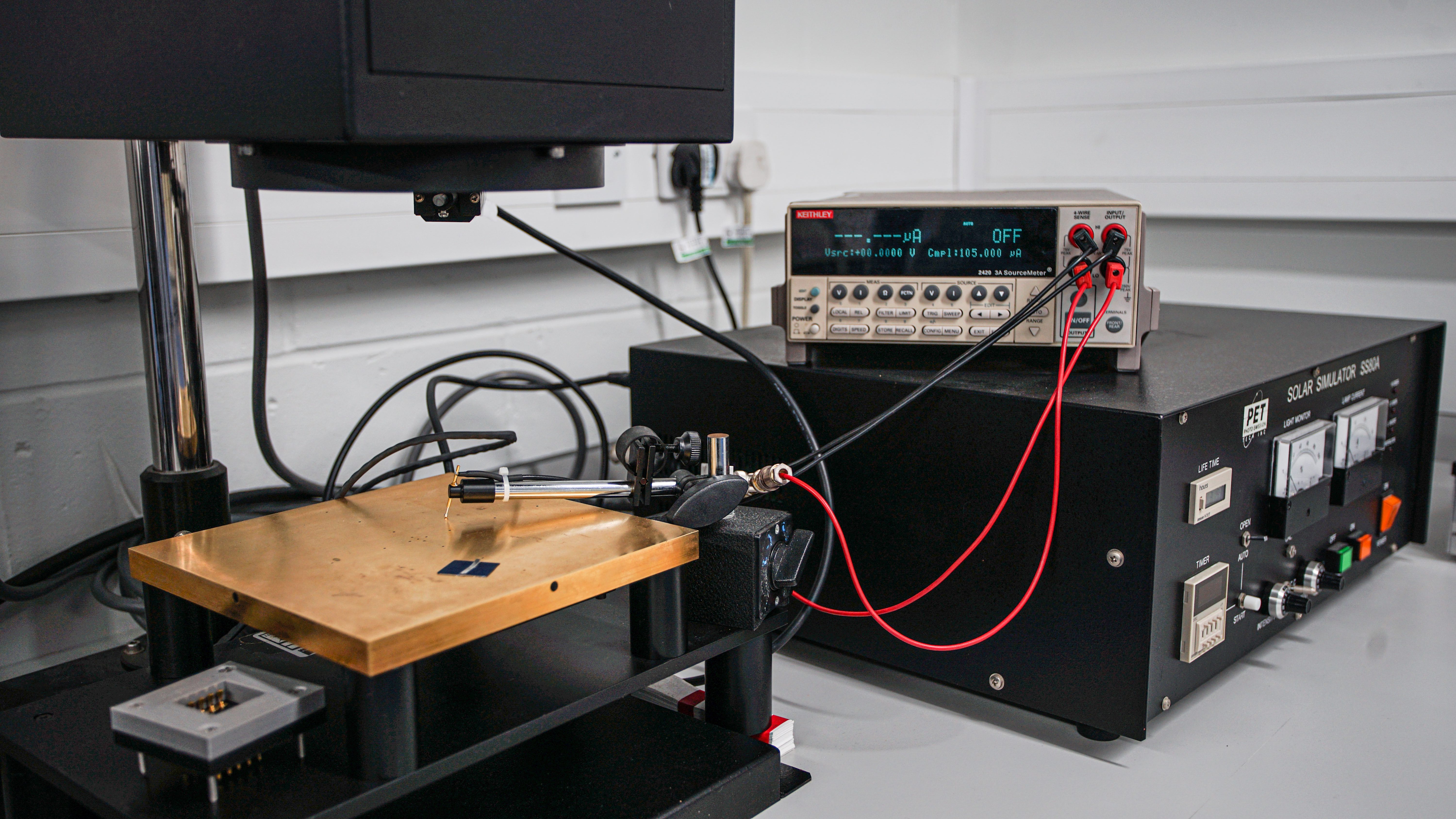
Solar Simulators
